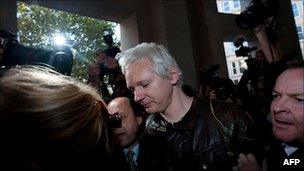Occupy London protests in financial district
- Published
One protester told the BBC's Phil Bodmer "there's a lot of anger on the streets at the moment"
Up to 3,000 people have been demonstrating in London's financial district as part of a worldwide protest against alleged corporate greed.
Demonstrators, inspired by the Occupy Wall Street movement in the US, are protesting outside St Paul's Cathedral.
Scotland Yard said five people had been arrested - three for assault on police and two for public order offences.
Organisers say they intend setting up a campsite but police said they would not allow this in front of the cathedral.
Such a move would be "illegal and disrespectful", they said.
The global organisers of the 15 October protests said on their website, external that the aim was to "initiate the global change we want".
They said rallies would be held in 951 cities in 82 countries.
Smaller demonstrations have taken place in other cities across the UK, including Bristol, Birmingham, Glasgow and Edinburgh.
Earlier, demonstrators attempted to set up another camp outside the London Stock Exchange in privately-owned Paternoster Square in the City, but were prevented by the police.
After protesters returned to St Paul's Churchyard, the square in front of the cathedral, officers prevented more people trying to join the protest by cutting off access points.
Several hundred protesters congregated behind the police lines and heckled officers for not allowing anyone through.
Activists carried banners with slogans such as "We are the 99%" and "Bankers got a bailout, we got sold out".
'Kettling denied'
But police at the scene said a "kettling" technique had not been used and that protesters were free to leave the square.
Later, they said that a "containment" was in place at St Paul's Churchyard "to prevent breach of the peace".
Scotland Yard confirmed there had been no major disorder. Three arrests were made for assaults on police officers and two for public disorder.
A section 60aa order - which gives officers the power to force people to remove masks covering their faces - is also currently in place in the City of London.
As night fell on Saturday, protesters said they intended setting up a camp in the area in front of the cathedral and began putting up tents and bringing in portable toilets.
But Scotland Yard urged people to leave.
A statement said: "We continue to urge all peaceful protesters to leave the area around St Paul's Cathedral and return home.
"Their continuing presence in the area is causing disruption to the daily life of the City and is denying access to St Paul's Cathedral.
The cathedral's Sunday Holy Communion is scheduled to begin at 0800 BST.
'People over profit'
The BBC's Maddy Savage at the scene said demonstrators included students, unemployed graduates, pensioners and even passing tourists who have warmed to the campaign.
She said: "They may not be a coherent group but they appear united in their goal - to criticise the UK's bankers and speak for what they describe as 'people over profit'."
One protester, Peter, said: "We're occupying and opening up this space directly next door to an institution which gambled with our economy recklessly and criminally."
He added: "My intention is to stay here as long as possible and I think many people feel the same way."
BBC reporter Phil Bodmer said there were about 2,000 to 3,000 protesters taking part, however police were unable to give an official estimate.
Our reporter said it was a "good natured, noisy demonstration" with a "fairly sizeable" police presence.

Wikileaks founder Julian Assange addressed protesters outside St Paul's Cathedral
Julian Assange, the founder of Wikileaks, gave a speech to one group of protesters about anonymity after he was challenged by police for wearing a mask as he walked to the protest.
He said: "I ask that all of you demand that foreign bank accounts be opened up and made transparent, the same way that I today have been forced to be made transparent."
A spokeswoman for the protesters said Mr Assange then gave a speech where he talked about Wikileaks, police oppression and the current economic situation.
One protester, Anna, said she was hopeful that the demonstration would have an impact on governments and big businesses.
"These things take time. If they don't listen today, then we will stay here until they listen. This movement is not going away, this is a building global movement.
"There's a shift in the world - you don't have to be a genius to see our system's broken."
- Published15 October 2011
- Published15 October 2011
- Published15 October 2011
- Published14 October 2011
- Published14 October 2011